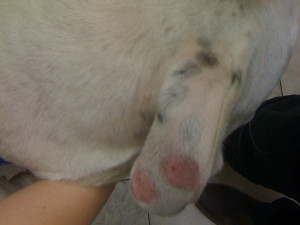[dog_breed_widget id=133]
Dachshund’s pregnancy will normally last somewhere about 63 -65 days, but in some cases, the length of the pregnancy can be up to 70 days.
In this article, we are going to give you some practical information concerning your Dachshund pregnancy symptoms, gestation period, how to help, and pregnancy on a week by week basis.
Understanding Dachshund Pregnancy Symptoms
Dachshunds, with their unique long bodies and expressive eyes, are beloved companions for many dog enthusiasts. As these adorable creatures embark on the journey of motherhood, it’s essential for owners to recognize the signs and symptoms of pregnancy to ensure proper care and support for their furry friends.
- Behavioral Changes: Expectant dachshunds may become more affectionate or seek solitude, while their appetite might fluctuate, leading to changes in eating habits. Some dachshunds may experience morning sickness, which could manifest as vomiting or lethargy.
- Physical Changes: Around the third week of pregnancy, a dachshund’s nipples may become enlarged and more prominent. As the pregnancy advances, her abdomen will gradually expand to accommodate the growing litter, becoming noticeably rounder. Additionally, dachshunds may experience a decrease in energy levels as their bodies work overtime to support the developing puppies.
Proper care during dachshund pregnancy is crucial to ensure the health and safety of both the mother and her puppies.
- Nutritious Diet: Providing a nutritious diet rich in essential nutrients, vitamins, and minerals is paramount to support the mother’s health and the puppies’ development.
- Regular Veterinary Check-ups: Regular veterinary check-ups and consultations are recommended to monitor the pregnancy’s progress, address any concerns, and prepare for a smooth delivery.
Gestation Period: How Long Are Dachshunds Pregnant?
Dachshunds are pregnant for approximately 63 days.
Pregnancy Care for Dachshunds
I prepared the list of 6 crucial points you must be aware of:
- Nutrition: Providing a high-quality, balanced diet is crucial during pregnancy. Dachshunds require increased nutrients to support the growing puppies and maintain their own health. Consult with a veterinarian to determine the best diet plan for your pregnant dachshund.
- Exercise: While moderate exercise is beneficial for dachshunds during pregnancy, it’s essential to avoid strenuous activities that could strain the mother or harm the developing puppies. Short walks and gentle play sessions are usually appropriate.
- Regular Veterinary Check-ups: Schedule regular check-ups with a veterinarian to monitor the dachshund’s health and the progress of her pregnancy. The vet can provide valuable guidance, conduct necessary tests, and address any concerns that arise.
- Supplementation: In some cases, veterinarians may recommend prenatal supplements for pregnant dachshunds to ensure they receive adequate vitamins and minerals. However, it’s essential to consult with a veterinarian before administering any supplements.
- Preparation for Birth: As the due date approaches, prepare a comfortable and quiet space where the dachshund can give birth and care for her puppies. Have necessary supplies on hand, such as clean bedding, towels, and a whelping box.
- Monitoring Behavior: Pay attention to any changes in the dachshund’s behavior or physical condition throughout the pregnancy. Contact a veterinarian immediately if you notice signs of distress, unusual lethargy, or complications.
Dachshund Pregnancy Week by Week
Week 1
The ovulation takes place at the end of the cycle. In a few days after the mating, the sperm reaches the eggs and fertilization occurs. However, the mating itself doesn’t ensure pregnancy.
Week 2
The fertilized eggs make their way to the uterus for implantation. The nipples of your Dachshund are growing bigger. There may be some changes in behavior: pregnant dogs usually tend to be more affectionate.
This is high time to visit a vet doctor for a checkup and exam.
Week 3
Implantation has taken place and the fetuses begin to develop. Your Dachshund may show some mild mood swings, and changes in the appetite; the development in the breast tissue is taking place.
Week 4
Visit your vet doctor one more time to confirm the pregnancy by means of an ultrasound examination. At this stage, a vet is able to already determine how many puppies your dog has, as well as to detect some possible abnormalities.
As fetuses begin to grow and develop, your dog’s appetite will likely increase. Actually, now your dog should eat 50% more food than she normally consumes. The diet should be rich in protein. The best food is meat porridges, dairy products and cooked vegetables.
Week 5
During this week the fetuses weight will increase by 75%. They develop their sex organs and actually begin to look like puppies. The belly of your dog is big and swollen. It is high time to feed your Dachshund more frequently but with smaller portions.
Week 6
Future puppies are big and this fact will cause some discomfort for the mother. She may vomit occasionally due to the extra pressure against her stomach. At this point, you should care for your dog to have no stress at all.
Your Dachshund’s nutritional requirements will change, as she now requires a diet with higher energy, protein and mineral content.
Week 7
Worms may be very dangerous for the puppies, so, ask your vet about the best product to deworm your dog.
Your dog is very anxious, feeling it is soon time to give birth to the puppies. Start to prepare a whelping box/place.
Week 8
Milk begins to flow from the nipples. Start to prepare for whelping.
You can ask your vet for an extra ultrasound examination to count the exact number of puppies.
Week 9
The pups are ready for birth. Your dog may appear restless.
During this week your dog will whelp. Make sure, you are prepared for it and have made a safe and cozy whelping place for your dog where she will feel secure and calm.
You may notice your dog licking at her vulva and maybe have some moderate cramping. Abdominal contractions may become more frequent.
Whelping can last from a few minutes to several hours. Check on your dog every 15 minutes to ensure that everything is going right.
Newly born puppies need extra warmth, so, provide them with blankets.
Keep your dog rested so she can get used to her new “role” – being a mother.
Be prepared to feed puppies in some cases. Feeding Kit could be very helpful.
Average Litter Size for Dachshunds
The average litter size for dachshunds typically ranges from 4 to 6 puppies. However, litter size can vary based on factors such as the dachshund’s age, health, and genetics, as well as the size of the mother.
How to support to dachshunds during the labor
- Stay Calm and Supportive: Provide a calm and supportive presence to reassure the dachshund during labor.
- Keep the Area Quiet: Create a quiet and stress-free environment for the dachshund to give birth.
- Monitor Progress: Keep an eye on the dachshund’s contractions and the delivery of puppies to ensure everything is progressing normally.
- Assist with Cleaning: Help remove the sac from newborn puppies and gently clean them if necessary.
- Provide Nutritious Snacks: Offer small, nutritious snacks and water to the mother to maintain her energy levels.
- Contact Veterinarian if Needed: Be prepared to contact a veterinarian if there are signs of distress or complications during labor.
These specific actions can provide practical assistance and support to dachshunds during the labor process.
What not to do and common mistakes during labor
During labor, it’s important to avoid certain actions and common mistakes that could potentially harm the dachshund or her puppies. Here’s what not to do during labor:
- Do Not Disturb: Avoid unnecessary disturbances or interruptions during the labor process. Minimize noise and activity in the birthing area to keep the dachshund calm and focused.
- Do Not Pull Puppies: Avoid pulling on newborn puppies during delivery unless absolutely necessary. Excessive pulling can cause injury to the puppies or the mother.
- Do Not Delay Veterinary Assistance: If labor appears prolonged, or if the dachshund shows signs of distress or complications, do not hesitate to seek veterinary assistance promptly.
- Do Not Overhandle Puppies: Limit handling of newborn puppies during the first few days of life to prevent stress and potential injury. Allow the mother to bond with her puppies naturally.
- Do Not Neglect Postpartum Care: After delivery, do not neglect postpartum care for the mother and her puppies. Ensure they have a clean and warm environment, and monitor their health closely.
- Do Not Ignore Warning Signs: Pay attention to warning signs such as excessive bleeding, prolonged labor without progress, or signs of infection in the mother or puppies. Ignoring these signs could lead to serious complications.
- Do Not Stress the Mother: Avoid unnecessary stress or anxiety for the mother dachshund during labor and after delivery. Provide a calm and supportive environment to promote a smooth recovery.
Newborn Health Monitoring
Ensure Newborn Health with Our Premium Bundle! Access high-quality PDFs for seamless tracking. Monitor weight, log daily/weekly details, and capture birth specifics with Whelping Details. Effortlessly manage health using Vaccination Records. Elevate your puppy care – Order Now!













